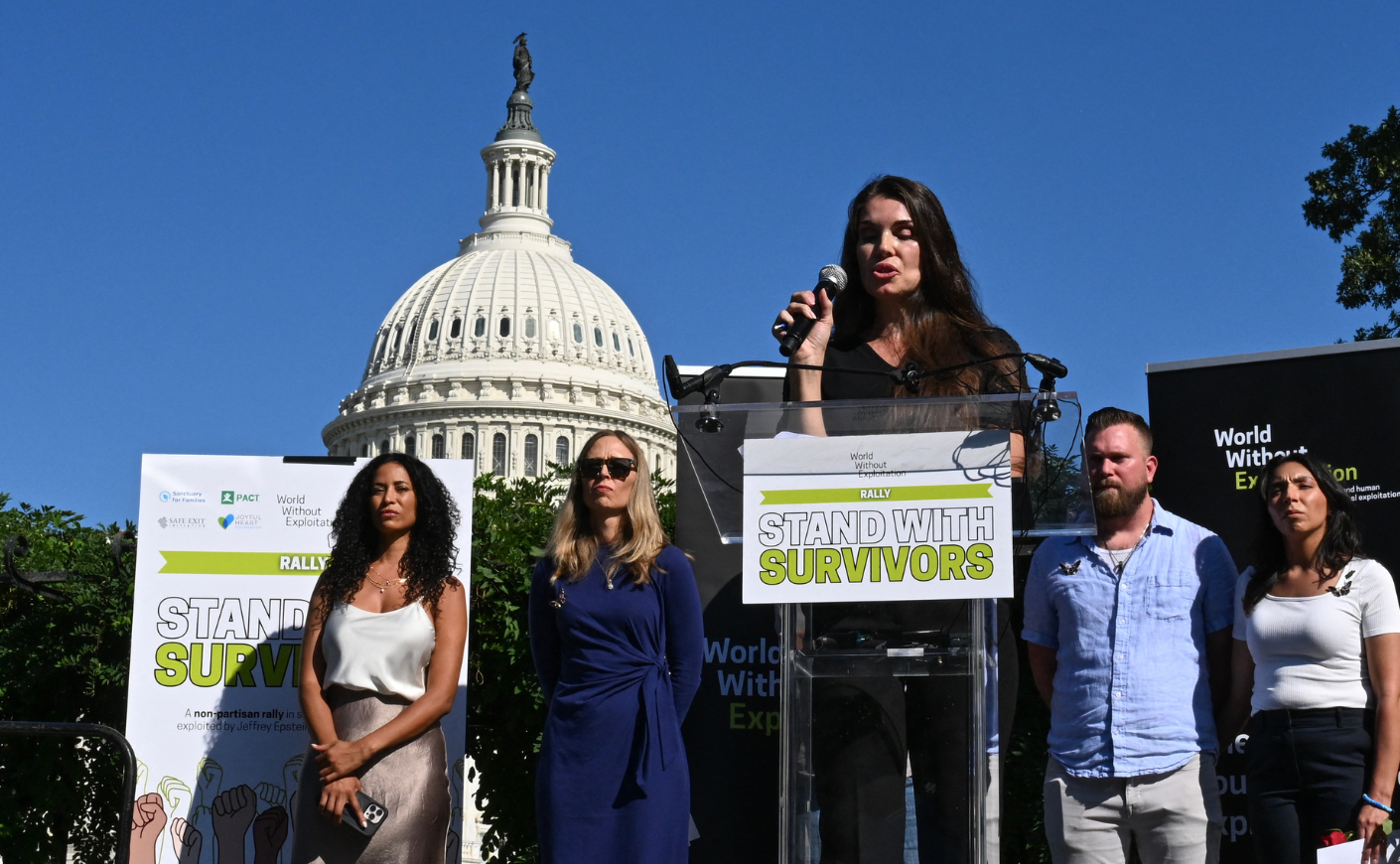At a gut-wrenching press conference Wednesday, 10 survivors of abuse by Jeffrey Epstein stood on the Capitol steps to recount their experiences with the convicted sex offender. More than two decades after Epstein first faced charges of exploiting underage girls, their testimonies were as harrowing as ever — a stark reminder of his heinous crimes.
Not all survivors could attend. Sky Roberts, the brother of Virginia Roberts Giuffre — who died by suicide earlier this year, and whose memoir Nobody's Girl will be published posthumously in October — spoke in her place. “This is about justice against the rich and powerful who have stolen something from these women and many children at the time: their freedom,” he said.
The presser took place as a bipartisan pair of lawmakers push to force the government's release of all files related to the Epstein case — a move facing stiff opposition. Here’s a closer look at what's happened and why it’s become such a flashpoint.
What did survivors say at the press conference?
The survivors called for the full release of the Epstein files. Haley Robson made a direct appeal to President Trump, urging him to use his authority to make the documents public. She also pushed back on his repeated claims that the case is a “hoax,” responding simply: “The abuse was real.”
For some, it was the first time they'd spoken publicly about their trauma. Marina Lacerda, who said she worked for Epstein from age 14 to 17 — until he told her she was “too old” — added that she provided key evidence that helped prosecutors charge him in 2019. “The least that they can give me is my documents that they have about me,” she said.
Annie Farmer, another survivor, recalled: “I was 16 years old when I was flown to New Mexico to spend a weekend with Epstein and Maxwell. I am now 46 years old. Thirty years later, we still do not know why that report wasn’t properly investigated or why Epstein and his associates were allowed to harm hundreds, if not thousands, of other girls and young women.”
Lisa Phillips described being taken to Epstein’s private island in the Caribbean in 2000, where she said she got “a glimpse into a very large and disturbing world.” She told reporters that his influence reached “to the very top of fashion, arts and entertainment” and stressed that abuse extended far beyond Florida, with “hundreds also abused in New York.” She called Epstein not just a “serial predator,” but an “international human trafficker."
"We are not asking for pity,” Phillips said. “We are here demanding accountability. And I’m demanding justice. Congress must choose whether it will protect predators or survivors.”
Other survivors voiced anger at what they see as leniency for Epstein’s enablers. Teresa Helm pointed to Ghislaine Maxwell’s transfer to what she described as a “prison spa,” saying it underscores how the system continues to protect the powerful at survivors’ expense.
Frustrated by the government’s secrecy, the survivors said they are now compiling their own list of Epstein’s known associates. “We know their names,” Phillips said. “We all know.”
Why now?
Democratic Rep. Ro Khanna and Republican Rep. Thomas Massie organized the press event to seize on growing public outrage and galvanize support for their Epstein Files Transparency Act and the accompanying discharge petition — which would force a House floor vote on the matter, bypassing typical leadership roadblocks.
The proposal would require the Justice Department to release all unclassified records related to Epstein. That could cover flight logs, names linked to criminal activity, civil settlements, and immunity or plea agreements. As the bill states: “No record shall be withheld, delayed, or redacted on the basis of embarrassment, reputational harm, or political sensitivity, including to any government official, public figure, or foreign dignitary.”
The event came just one day after the House Oversight Committee released more than 33,000 pages of documents tied to the Epstein and Maxwell cases. But survivors and lawmakers quickly criticized the release, noting that about 97 percent of the material was already public — and much of it was heavily redacted.
Where does the petition stand?
So far, just four Republican representatives have signed on: Thomas Massie, Nancy Mace, Marjorie Taylor Greene, and Lauren Boebert — some of the most conservative members of the party. With all 212 Democrats expected to back the measure, only two additional Republicans would be needed to reach the 218 signatures required to force a House floor vote.
Khanna praised the GOP signers for breaking ranks. “We’ve got to stop the partisanship on this issue. This is an issue where they both have shown real courage and leadership, and I appreciate them joining us today,” he said of Greene and Massie.
But GOP leadership is not on board. After an hours-long meeting with Epstein survivors on Tuesday, House Speaker Mike Johnson said the party remained committed to transparency but reiterated his opposition to the petition. “It does not adequately protect the innocent victims, and that is a critical component,” he said.
Instead, on Wednesday House Republicans approved a measure backing the Oversight and Government Reform Committee’s ongoing investigation into Epstein’s network — a largely symbolic vote to signal support for the probe.
Breaking with leadership, Massie dismissed that resolution as “meaningless” and again urged colleagues to sign his petition. While stressing he didn’t believe Trump had committed “anything criminal,” he speculated the former president “may be covering for some rich and powerful people.”
He framed the fight as a moral test as much as a political one: “I hope my colleagues are watching this press conference. I want them to think: What if this was your sister? What if this was your daughter?”









